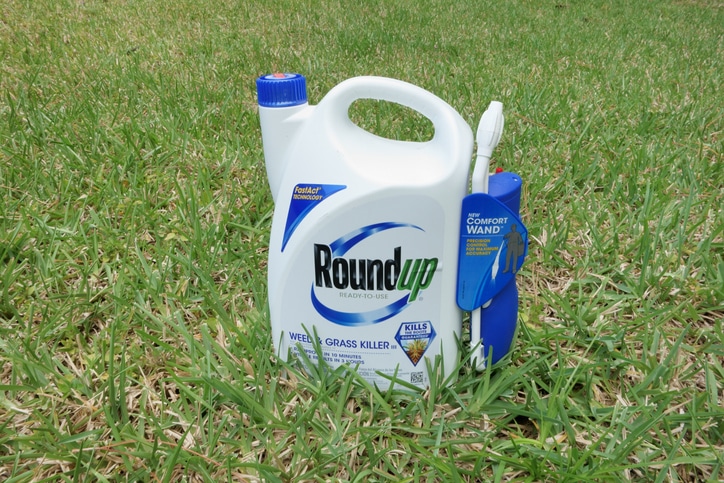Paraquat Lawsuit Overview
Lawsuits against manufacturers of Paraquat dichloride allege that exposure to this toxic herbicide causes Parkinson's disease and other serious health conditions.
Paraquat is one of the most widely used herbicides in the world, which prevents the growth of weeds and grass near crops on large and small commercial farms, estates, plantations, and orchards.
Sold under the brand names Gramoxone and Ortho Paraquat, the chemical is a common alternative for weeds that have become resistant to glyphosate, an ingredient in Monsanto’s Roundup weed killer.
Plaintiffs claim that Syngenta and Chevron failed to adequately warn about these severe risks despite having knowledge of them.
Over 1,300 Paraquat lawsuits have been filed across the United States. The EPA classifies Paraquat as a "restricted-use pesticide" due to its extreme toxicity, limiting its use to licensed applicators only.
Latest Paraquat Lawsuit 2025 Updates
The steady growth of the Paraquat MDL class action lawsuit reflects the widespread nature of claims linking Paraquat exposure to Parkinson’s disease.
Many cases allege Syngenta and Chevron failed to warn about the risks of chronic exposure to the herbicide.
- July 2025: The MDL now includes 6,354 pending lawsuits, reflecting an ongoing influx of new plaintiff filings even as settlement talks progress. This demonstrates continued legal interest and potential exposure for Paraquat manufacturers [1]. Attorneys for both sides continue negotiations to finalize a global settlement. If no agreement is reached, bellwether trials will proceed as planned. This stage is pivotal in determining whether mass compensation or further litigation will follow [2].
- 2023: The Guardian published the "Paraquat Papers," revealing Syngenta's internal documents showing the company's efforts to influence scientific research on the connection between its Paraquat weedkiller and Parkinson's disease [3].
- June 2022: A Second Amended Discovery Schedule was issued, extending deadlines for fact discovery to July 25, ensuring trials remained on schedule for late 2022 [4].
- May 2022: Record filings with 57 new cases added in one week brought the total to over 1,150 plaintiffs by mid-May. The Supreme Court ruled against Bayer's FIFRA preemption argument, setting a precedent likely to impact Syngenta and Chevron's legal strategies [5].
- June 7, 2021: The U.S. Judicial Panel on Multidistrict Litigation (JPML) ordered all federally filed Paraquat lawsuits to be consolidated into MDL No. 3004 in the U.S. District Court for the Southern District of Illinois, overseen by Chief Judge Nancy J. Rosenstengel. This action centralized dozens of cases involving claims of Parkinson’s disease linked to Paraquat exposure to facilitate coordinated pretrial proceedings [6].
FDA Reports and Statistics
According to the EPA's 2023 notice, Paraquat dichloride is classified as a "restricted-use pesticide" that can only be used commercially by licensed applicators [7].
The U.S. Centers for Disease Control and Prevention (CDC) has documented how Paraquat works by inhibiting photosynthesis and producing destructive reactive oxygen species that cause cell death [8].
Research findings from multiple studies show:
- A 2009 CDC study revealed a 75% increased risk of Parkinson's disease for individuals exposed to Paraquat within 1,600 feet of their homes.
- Five case-control studies in 2014 showed agricultural workers using Paraquat have twice the risk of developing Parkinson's disease compared to the general population.
- A 2006 study published in the British Journal of Psychiatry estimated 300,000 deaths occur each year in the Asia-Pacific region due to self-poisoning with herbicides like Paraquat.
The National Institute of Health (NIH) study from 2022 confirmed that people affected by exposure have an increased risk of developing Parkinson's disease in commercial agriculture or when living near commercial farms.
Paraquat Injuries & Side Effects
Exposure to Paraquat can lead to various severe health effects, with both acute and chronic complications reported.
- Parkinson's Disease: Multiple studies have linked Paraquat exposure to a significantly increased risk of developing this neurodegenerative disorder affecting movement control.
- Kidney Failure: Paraquat concentration in cells leads to multi-organ failure, with the kidneys being particularly vulnerable to damage.
- Liver Damage: Toxic effects can cause severe liver dysfunction and eventual failure.
- Lung Scarring: Respiratory complications including pulmonary fibrosis have been documented in those exposed to Paraquat.
- Cognitive Impairment: Brain cell damage from Paraquat exposure can lead to various cognitive issues and neurological complications.
Uncovering the Paraquat-Parkinson’s Connection
The link between Paraquat exposure and Parkinson’s disease has been the focus of extensive research, revealing alarming associations between this toxic herbicide and the development of the neurological disorder.
Understanding Parkinson’s disease is essential to grasp the gravity of these findings and their implications.
What Is Parkinson's?
According to the Mayo Clinic research published in 2023, Parkinson's disease is a central nervous system disorder (CNS) that affects movement, often including tremors [9].
The onset of symptoms occurs gradually, sometimes starting with a barely noticeable tremor in just one hand. Tremors are common, but the disorder also causes stiffness or slowing of movement.
Parkinson's Disease Symptoms
Motor Symptoms
- Tremors: Involuntary shaking, often starting in the hands.
- Stiff Muscles: Rigidity in muscles, leading to discomfort and limited movement.
- Difficulty Standing: Challenges in maintaining balance and posture.
- Difficulty Walking: Issues with initiating or maintaining a steady gait.
- Slow Bodily Movement: Reduced speed in physical movements (bradykinesia).
- Slow Shuffling Gait: A characteristic slow and dragging walk.
Involuntary Movements
- Involuntary Movements: Uncontrolled movements that can occur at rest or during activities.
- Rhythmic Muscle Contractions: Repetitive muscle movements that may be involuntary.
Coordination Problems
- Problems with Coordination: Difficulty in coordinating movements, affecting daily activities.
Treatment
According to Johns Hopkins Medicine, Parkinson's disease can't be cured. Prescription medications can significantly improve your symptoms [11].
In severe cases, surgery to regulate certain regions of the brain and improve symptoms may be required.
Do You Qualify for a Paraquat Lawsuit?
You may qualify for a Paraquat lawsuit if:
- You were exposed to Paraquat through agricultural work, living near farms where it was used, or other direct contact.
- You have been diagnosed with Parkinson's disease or other serious health conditions linked to Paraquat exposure.
- Your exposure occurred prior to your diagnosis.
- You can establish a connection between your exposure and your health condition.
- You file within the statute of limitations in your state (typically 2-3 years from diagnosis or discovery of the connection).
Evidence Required for a Paraquat Lawsuit
To build a strong case, you'll need to gather:
- Medical records documenting your diagnosis of Parkinson's disease or other related health conditions
- Employment records if you worked with or around Paraquat
- Licensure records for the Paraquat applicator
- Herbicide application records obtained from farms
- Purchase receipts for Paraquat-containing herbicides
- Photos documenting Paraquat application or products
- Witness testimony from those who can confirm your exposure
Damages You Can Recover
If your lawsuit is successful, you may receive compensation for:
- Medical expenses, including past and future treatments
- Lost income and reduced earning capacity
- Pain and suffering, including physical discomfort and emotional distress
- Home health care and assisted living costs
- Punitive damages in cases where the manufacturer's actions were particularly egregious
Settlements in Paraquat lawsuits are expected to average between $100,000 and $150,000, with variation based on exposure duration, severity of disease, and financial losses.
Paraquat Recall Information
As of April 2025, there has not been a formal recall of Paraquat in the United States. The herbicide remains approved for use by licensed applicators despite being banned in over 30 countries worldwide due to health and safety concerns.
Legislative efforts to ban Paraquat in the U.S. include:
- The Protect America's Children from Toxic Pesticides Act of 2020 [12]
- The Protect Against Paraquat Act of 2019 [13]
Paraquat “causes heart failure, kidney failure, liver failure, lung scarring, and damage to brain cells; and greatly increases the risk of developing Parkinson’s disease.”- The Protect America’s Children from Toxic Pesticides Act of 2020
However, to date, no legislation to ban Paraquat has been successful in the United States.
Statute of Limitations for Paraquat Lawsuits
The statute of limitations for Paraquat lawsuits varies by state, but in most U.S. states, plaintiffs must file a personal injury claim within 2 to 3 years of the date of injury or discovery of the connection between Paraquat exposure and their condition.
Some states apply the "discovery rule," which means the clock starts when you knew or should have known that your Parkinson's disease was connected to Paraquat exposure.
Missing the statute of limitations deadline in your state may bar you from filing a Paraquat lawsuit, making it critical to consult with an experienced Paraquat lawyer as soon as possible.
See all related toxic tort lawsuits that we've covered.
FAQs
Time is limited to pursue legal action for Paraquat-related injuries. With most states allowing only 2-3 years from diagnosis or discovery of the connection to file a claim, acting quickly is essential to protect your legal rights.
At Schmidt & Clark, LLP , we offer:
- Free, confidential consultations to evaluate your case
- No upfront costs for our legal services
- Payment only if we win your case and secure compensation
- Fast-Track Claims to expedite your case
- Nationwide representation in all 50 states
Don't risk losing your right to compensation. With over 1,300 Paraquat lawsuits already filed and settlement discussions advancing, now is the time to have your case evaluated.
References:
- https://federal-lawyer.com/injury-lawsuit/paraquat/
- https://www.robertkinglawfirm.com/personal-injury/paraquat-lawsuit/
- https://www.theguardian.com/us-news/2023/jun/02/paraquat-parkinsons-disease-research-syngenta-weedkiller?CMP=oth_b-aplnews_d-1
- https://www.ilsd.uscourts.gov/sites/ilsd/files/ParaquatSecondOrderAmendingDiscoverySchedule.pdf
- https://www.millerandzois.com/products-liability/paraquat/
- https://newyork.legalexaminer.com/legal/jpml-orders-consolidation-of-all-federally-filed-paraquat-lawsuits/
- https://www.epa.gov/ingredients-used-pesticide-products/paraquat-dichloride#:~:text=Using%20Paraquat%20Dichloride%20Products%20Safely,-If%20you%2C%20your&text=Be%20used%20only%20by%20a,drink%20or%20any%20other%20container.
- https://emergency.cdc.gov/agent/paraquat/basics/facts.asp
- https://www.mayoclinic.org/diseases-conditions/parkinsons-disease/symptoms-causes/syc-20376055
- https://my.clevelandclinic.org/health/diseases/8525-parkinsons-disease-an-overview
- https://www.hopkinsmedicine.org/health/conditions-and-diseases/parkinsons-disease/parkinsons-treatment-options
- https://www.congress.gov/bill/117th-congress/senate-bill/3283
- https://www.congress.gov/bill/116th-congress/house-bill/3817/committees

 Published by
Published by 







